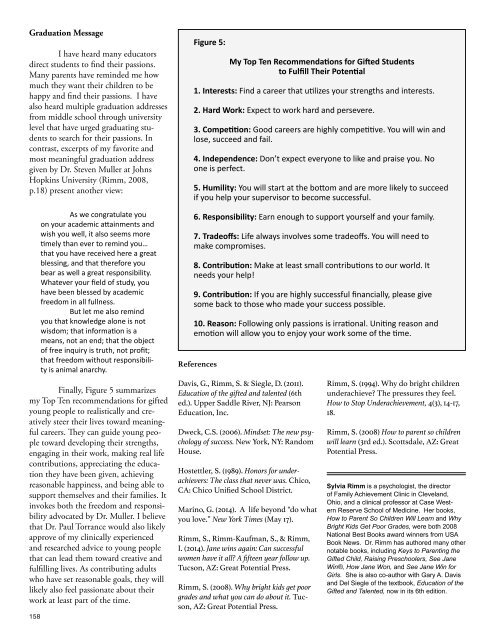Torrance Journal for Applied Creativity
TorranceJournal_V1
TorranceJournal_V1
You also want an ePaper? Increase the reach of your titles
YUMPU automatically turns print PDFs into web optimized ePapers that Google loves.
Graduation Message<br />
I have heard many educators<br />
direct students to find their passions.<br />
Many parents have reminded me how<br />
much they want their children to be<br />
happy and find their passions. I have<br />
also heard multiple graduation addresses<br />
from middle school through university<br />
level that have urged graduating students<br />
to search <strong>for</strong> their passions. In<br />
contrast, excerpts of my favorite and<br />
most meaningful graduation address<br />
given by Dr. Steven Muller at Johns<br />
Hopkins University (Rimm, 2008,<br />
p.18) present another view:<br />
158<br />
As we congratulate you<br />
on your academic attainments and<br />
wish you well, it also seems more<br />
timely than ever to remind you…<br />
that you have received here a great<br />
blessing, and that there<strong>for</strong>e you<br />
bear as well a great responsibility.<br />
Whatever your field of study, you<br />
have been blessed by academic<br />
freedom in all fullness.<br />
But let me also remind<br />
you that knowledge alone is not<br />
wisdom; that in<strong>for</strong>mation is a<br />
means, not an end; that the object<br />
of free inquiry is truth, not profit;<br />
that freedom without responsibility<br />
is animal anarchy.<br />
Finally, Figure 5 summarizes<br />
my Top Ten recommendations <strong>for</strong> gifted<br />
young people to realistically and creatively<br />
steer their lives toward meaningful<br />
careers. They can guide young people<br />
toward developing their strengths,<br />
engaging in their work, making real life<br />
contributions, appreciating the education<br />
they have been given, achieving<br />
reasonable happiness, and being able to<br />
support themselves and their families. It<br />
invokes both the freedom and responsibility<br />
advocated by Dr. Muller. I believe<br />
that Dr. Paul <strong>Torrance</strong> would also likely<br />
approve of my clinically experienced<br />
and researched advice to young people<br />
that can lead them toward creative and<br />
fulfilling lives. As contributing adults<br />
who have set reasonable goals, they will<br />
likely also feel passionate about their<br />
work at least part of the time.<br />
Figure 5:<br />
My Top Ten Recommendations <strong>for</strong> Gifted Students<br />
to Fulfill Their Potential<br />
1. Interests: Find a career that utilizes your strengths and interests.<br />
2. Hard Work: Expect to work hard and persevere.<br />
3. Competition: Good careers are highly competitive. You will win and<br />
lose, succeed and fail.<br />
4. Independence: Don’t expect everyone to like and praise you. No<br />
one is perfect.<br />
5. Humility: You will start at the bottom and are more likely to succeed<br />
if you help your supervisor to become successful.<br />
6. Responsibility: Earn enough to support yourself and your family.<br />
7. Tradeoffs: Life always involves some tradeoffs. You will need to<br />
make compromises.<br />
8. Contribution: Make at least small contributions to our world. It<br />
needs your help!<br />
9. Contribution: If you are highly successful financially, please give<br />
some back to those who made your success possible.<br />
10. Reason: Following only passions is irrational. Uniting reason and<br />
emotion will allow you to enjoy your work some of the time.<br />
References<br />
Davis, G., Rimm, S. & Siegle, D. (2011).<br />
Education of the gifted and talented (6th<br />
ed.). Upper Saddle River, NJ: Pearson<br />
Education, Inc.<br />
Dweck, C.S. (2006). Mindset: The new psychology<br />
of success. New York, NY: Random<br />
House.<br />
Hostettler, S. (1989). Honors <strong>for</strong> underachievers:<br />
The class that never was. Chico,<br />
CA: Chico Unified School District.<br />
Marino, G. (2014). A life beyond “do what<br />
you love.” New York Times (May 17).<br />
Rimm, S., Rimm-Kaufman, S., & Rimm,<br />
I. (2014). Jane wins again: Can successful<br />
women have it all? A fifteen year follow up.<br />
Tucson, AZ: Great Potential Press.<br />
Rimm, S. (2008). Why bright kids get poor<br />
grades and what you can do about it. Tucson,<br />
AZ: Great Potential Press.<br />
Rimm, S. (1994). Why do bright children<br />
underachieve? The pressures they feel.<br />
How to Stop Underachievement, 4(3), 14-17,<br />
18.<br />
Rimm, S. (2008) How to parent so children<br />
will learn (3rd ed.). Scottsdale, AZ: Great<br />
Potential Press.<br />
Sylvia Rimm is a psychologist, the director<br />
of Family Achievement Clinic in Cleveland,<br />
Ohio, and a clinical professor at Case Western<br />
Reserve School of Medicine. Her books,<br />
How to Parent So Children Will Learn and Why<br />
Bright Kids Get Poor Grades, were both 2008<br />
National Best Books award winners from USA<br />
Book News. Dr. Rimm has authored many other<br />
notable books, including Keys to Parenting the<br />
Gifted Child, Raising Preschoolers, See Jane<br />
Win®, How Jane Won, and See Jane Win <strong>for</strong><br />
Girls. She is also co-author with Gary A. Davis<br />
and Del Siegle of the textbook, Education of the<br />
Gifted and Talented, now in its 6th edition.


